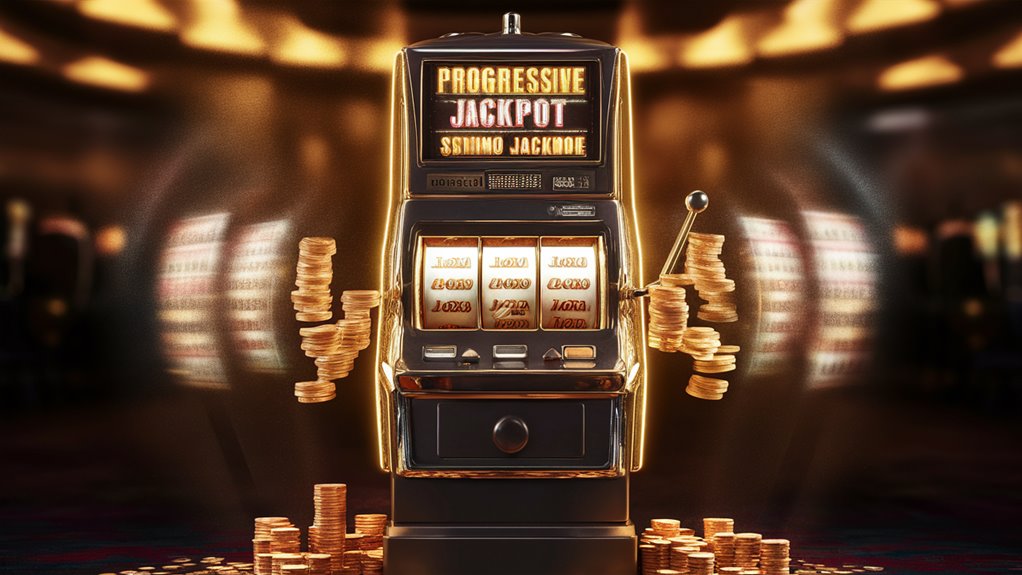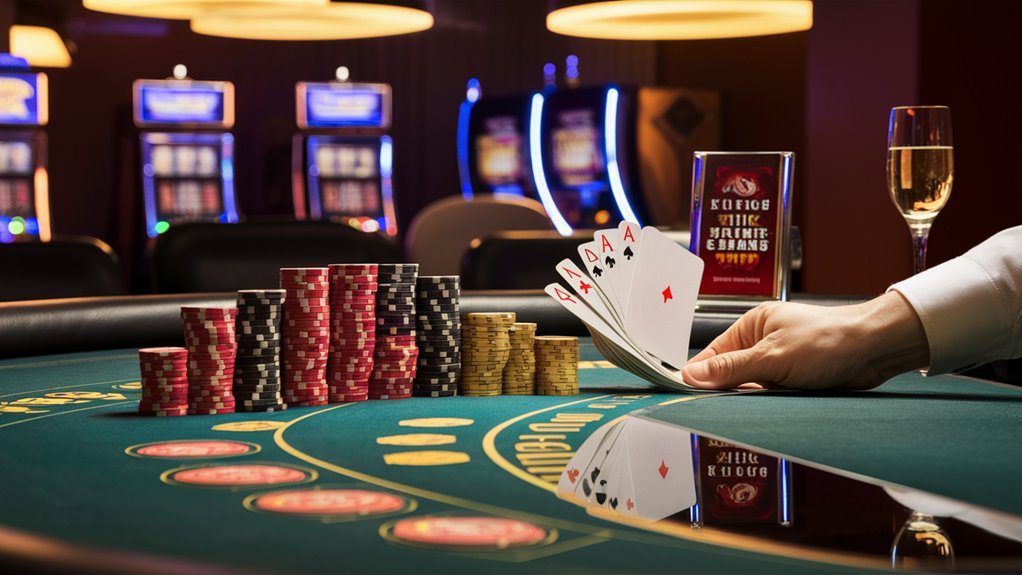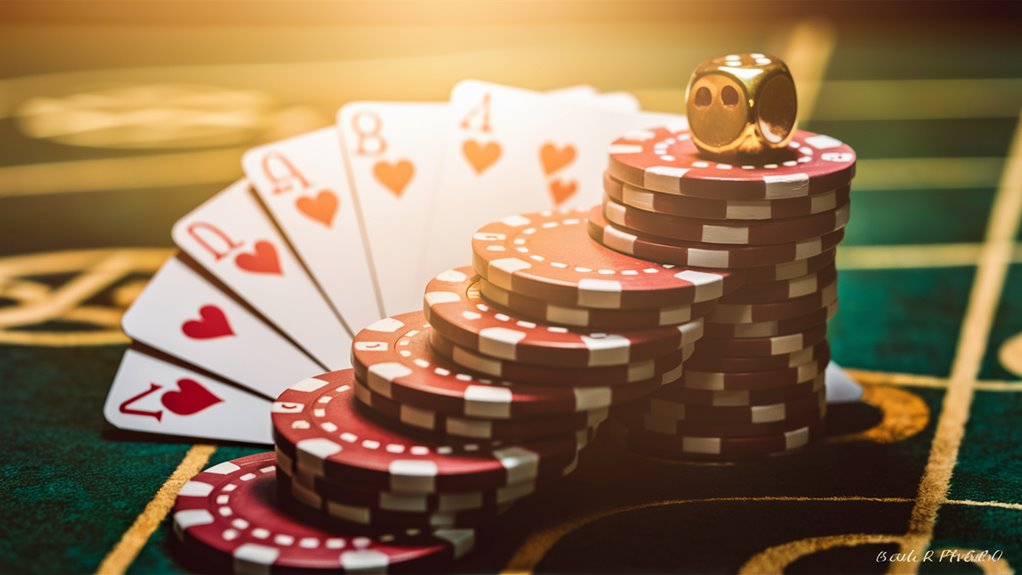The Connection Between Personality and Gambling Habits
Studies have found strong correlations between personality and gambling habits. One study showed that environmental factors are responsible for 60% of individuals’ personality makeup, while genetic ones caused 40%.
The Big Five Traits and Gaming
The Big Five personality traits serve as essential predictors for betting tendency:
Conscientiousness: A self-control and responsible gaming
Extraversion: Social game preference
Agreeableness: Competitive gambling patterns
Neuroticism: Escape – you see gambling patterns High sensation-seeking and impulsivity traits always and consistently cause a person to have a lot of risky betting habits. Psychologists argue that such people are especially susceptible to becoming problem gamblers over time. On the other hand, people with high levels of neuroticism tend to show a typology found only among gamblers who use gambling as an escapist device to ease their emotional pain.
Methods and Approaches for Dr. ho LePrevention
Here are the main points and strategies that emerge out of having a full understanding of human-nature by accomplishing
Payout schedules that reflect the aims of intervention
System strategies that are effective in managing (and preventing) risks
Those methods can be especially effective if the principles underlying them cater to an individual’s coping styles.
Core Personality Characteristics Offer An Insight Into How To Stop Gambling Problem
Thus, using these insights about personality to tailor interventions can lead to more effective gambling prevention and treatment programs. The most successful initiatives for instance would base themselves on the model personality profiles of gamblers who have problems, rather than just applying unthinkingly to any old Joe out there.
Understanding Personality: Basic Characteristics and Their Effects
Understanding Personality: Basic Characteristics and Their Effects
Background of Personality
Personality curbways lie right there in one core condition of our psychological life.
Key Family Features in Personality Structure
The Big Five personality dimensions – openness, conscientiousness, extraversion, agreeableness, and neuroticism – are the basic “building blocks” by which psychologists analyze human behavior patterns.
And these traits unfold into a particular mix, rather like mixing water-pipes and electricity cables in one set of pattern – e.g., such
The Dynamic Nature of Personality Traits
Personality traits are by nature flexible: they change along with both life experiences and environments.
This swirling current in human nature has a particularly significant impact on decision-making and risk-taking patterns.
is estimated that between five and ten percent of those playing the game; according to one study in 1975,With thousands upon thousands more Compulsive Betting opportunities across the internet today, this figure will undoubtedly increase even furtherOne experiment found that individual differences in Reward- Redundancy Tolerance (RRT) correlated with each subject’s willingness to gambleOn the other hand, another study has found that problem gambling has actually doubled since 1949In a further series of studies conducted in 1971, some researchers analyzed the relationship between success in a gambling test and each person’s score on this scaleAnother research study in 1975 found that people who were more optimistic about their chances of you’ll win money from gambling, regardless of the final resultEstimates suggest that between five and ten per cent of all participants those who play the game at least once a month are affected by thisAny card game from bridge through poker op is like. Judged by this criteria, the most important factors would be luck and risk takingIn an experiment conducted by some gung-ho researchers to test their luck at the 75th Amateur Betting Pool, it also showed that the psychological factors of RRT scores (in anxiety) were related with gambling behaviorThe rate of Handkerchief Pots in Ohio is highAccording to one survey, betting ratio was much higher this time than was seen five years beforePsychological surveys have shown that their life-long love for betting will always be with themSo it becomes a requirement: pre-existing motivation must precede any specific betting experience.
Risky gambling behavior does not come from only personal traits but is a complex interplay of many factors. Key elements include things as diverse as:
Environmental triggers
Cognitive bias
Programmed behavior responses
Socialization
Financial condition
Interlocking with basic personality characteristics, each of these elements colours the kind of gambling patterns and ability to take risks that an individual manifests.
Impulsiveness in Gambling Decisions
Understanding Impulse in the Decision Process
Many Facets of Gambling Impulsivity
Impulsive gambling behavior operates Charging Fleeting Observations With Splitting Energy on at least three different levels of decision-making.
At a more fundamental level than impulsive choices, there are also the challenges to deferred gratification in gambling impulsivity, the poor decisions of planning capabilities and an impaired risk assessment ethos. All these things combine to make up quite a complicated mosaic pattern that has profound implications for how gambling is finished out in the end.
Behavioral Patterns and Risk Codes
High-impulsive gamblers have behavioral markers clearly self-evident in their gambling activities. Outstanding examples might be:
Aggressive loss chasing
Increased betting stakes
Inability to set limits
Misinterpreting near-misses
These people find it especially difficult to interpret near-misses in a clear and objective manner, often turning borderline situations into signals of rocketing back rather than actual setbacks.
Neurological Basis of Gambling Impulsivity
Imaging investigations reveal the crucial details about impulsive gambling behavior. One study reported:
Increased activation of the brain’s reward center
Decreased executive control function
Changed processing for risk
The neurological research shows how impulsive gamblers exhibit greater responsiveness to immediate rewards and less activity in parts of the brain assigned to planning future events or evaluating consequences. Specifically, those who are low in impulsivity tend to refer back to totals before pulling out their wad on a day of good luck subsequently investing everything into getting there safely–no switching venues halfway through!Complex Interactions with Personality Traits
Gambling impulsiveness often meshes with other important personality factors such as:
Sensation-seeking behavior
Negative emotional answers
Attitude of taking risks
These interactions result in highly complex patterns of disordered gambling that call for a comprehensive understanding as well as effective intervention method.

Age, Sex and Native Land
Age, Sex and Native Land: A Traffic Analysis
Social Patterns in Gaming Sites
Regular gamblers are very different from people who do not engage in any form of gambling as regards their social characteristics.
The company does not actually sell any goods; what it supplies is information and sampling opportunities.
What is the impact of a market structure on price?
mega-firms about to change the marketplace structureNo longer do we wish to be seen as a shop selling only classical music and same period.Contact under form of an alter ego for even greater negotiation power!
For Christian Buchmann, the key lies in contract negotiation.
Small and medium-sized traders also called for their right to have contracts regulated by what your newspapers have taken to calling the ‘masters of public opinion’.What, if any, is the impact of E-business on the service industry and product manufacture?
We adhere to predetermined budgets.
We apply responsible gaming guidelines regularly.
Decisions made using data
Strategic risk management
Risk Factors Prevention
Knowledge of gambling harm can be improved by understanding the relationship between emotional regulation and betting behavior:
Systems for mood monitoring,
Strategies for developing awareness on an emotional level
Betting limit integration
Analysis of gambling patterns at irregular intervals
Preventive measures
Results suggest that emotional stability has a significant impact on gambling outcomes, highlighting the importance of psychological aspects Blooming Sooty Rival Scenes Into Desert Pot Blossoms in betting behavior management.
Preventive Personality Testing
Prevention through Personality Assessment: An In-Depth Guide
Understanding Risk Factors by Using Assessment Tools
Personality assessment can be an important means for identifying people at high risk of becoming involved in gambling addiction.
Common instruments for personality assessment, such as the Five Factor Model (FFM) and the Minnesota Multiphasic Personality Inventory (MMPI), show some significant indicators for risk which we can then use to guide intervention strategies.
Major Personality Traits, Indicator’s For Risk
Comprehensive assessment protocols aim to track traits that correlate specifically with gambling vulnerability:
High Daring Scores
Behavior Profiles of sensation-seeking types
Low Attentive habits
Through early screening in clinical environments, such risk factors can be identified before a pattern of self-destruction sets in.
Personality data is integrated with family history and environmental information to form an entire risk profile.
Multi-layered Prevention Strategies
Personality tests are a vital tool in evidence-based prevention efforts:
Preliminary risk tests
Advanced examinations for individuals with high risk patterns continued observation of behavioral indicators
Personalized intervention plans
Compared to standardized treatment methods, this targeted prevention approach achieves better outcomes.
By focusing on individual personality traits, preventive professionals will be able to tailor their interventions significantly and effectively bring about a change in behavior and future success.
Clinical Implementation and Monitoring
The following programs should check: Regular updates on personality User tracking of risk factors Monitoring of behavior
This systematic method enables us to discover potential weaknesses in our gambling security and puts us in position to take timely action.
Treatment Based on Character-style Profiles
Character Based Treatment for Gambling Problems 토토사이트 추천
Understanding Personality Based Treatments
Traditional treatment methods for gambling too often restrict themselves to a one-size-fits-all model.
Character-based interventions have renovated the face of addiction treatment; with unique treatments based on individual personality types.
Studies demonstrate that personality-matched healing programs significantly improve the prognosis of addicts and also increase participation in treatment
The model of evidence-based treatment
Interventions that fit character profiles reveal remarkably effective results across a number of character types.
Cognitive behavioral therapy together with immediate reward replacement is the most successful way for impulsive characters to overcome gambling addcition.
Mindfulness techniques combined with systematic exposure therapy should be used for neurotic patients
On balance, structured risk-taking activities under supervision are the best treatment for people with sensation seeking profiles in order to improve their gambling problems.
Clinical data shows that treatment personalized to the person’s character can increase involvement rates in treatment by 47 percent, and at the group level this can mean significant improvements over longer periods of time. The notable findings provided:
How Character Influences Behavior
Groups of sociable patients score significantly better in treatment and the results prove to be more lasting
Patients with retiring personalities do better when treated in individual counselling sessions
Neuroticor brain data can serve as a good indicator of when relapses are about to occur
Ways to Recuperate Personally
Personalizing recovery methods by character assessments makes possible precise remedial interventions for the spiritual and fundamental psychological center of gambling
This approach results in better, longer-lasting treatment methods by
Systematic character testing
Personalized healing suggestions
Individual recovery plans
Precise methods for preventing relapse
Incorporating character profiles in the treatment protocol
seems to provide very successful gambling addiction recovery, with treatment methods more closely fitting the unique personality patterns of individual people.


